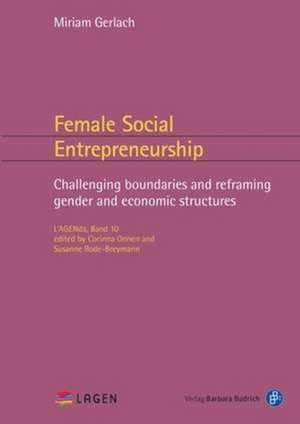Female Social Entrepreneurship – Challenging boundaries and reframing gender and economic structures: L'AGENda
Autor Miriam Daniela Gerlachen Limba Engleză Paperback – 8 iun 2022
Preț: 387.68 lei
Nou
Puncte Express: 582
Preț estimativ în valută:
74.18€ • 77.45$ • 61.40£
74.18€ • 77.45$ • 61.40£
Carte tipărită la comandă
Livrare economică 04-18 aprilie
Preluare comenzi: 021 569.72.76
Specificații
ISBN-13: 9783847425304
ISBN-10: 3847425307
Pagini: 290
Dimensiuni: 148 x 210 x 18 mm
Greutate: 0.32 kg
Editura: Columbia University Press
Seria L'AGENda
ISBN-10: 3847425307
Pagini: 290
Dimensiuni: 148 x 210 x 18 mm
Greutate: 0.32 kg
Editura: Columbia University Press
Seria L'AGENda
Notă biografică
Miriam Gerlach, M.A. is a research Associate at the Chair of Economics of Sustainability, University of Vechta, Germany.
Cuprins
1 Introduction
2 General Literature Overview on Social Entrepreneurship
2.1 Entrepreneurship
2.1.1 Origin and Definition of Entrepreneurship
2.1.2 The Entrepreneur
2.1.3 Context and Entrepreneurship
2.2 Social Entrepreneurship
2.2.1 Origin and Definition of Social Entrepreneurship
2.2.2 Social and Social Value
2.2.3 Forms of Social Entrepreneurship
2.2.4 Context in Social Entrepreneurship
2.2.5 Contributions of Social Entrepreneurship
2.2.6 Challenges of Social Entrepreneurship
3 Female Social Entrepreneurship
3.1 Gender
3.2 Short History of Female Social Entrepreneurship
3.3 Feminist Theories in Entrepreneurial Research
3.4 The current State of Research
3.4.1 Recent Research on Female Social Entrepreneurship
3.4.2 Female Social Entrepreneurship in Numbers
3.5 Potential of Female Social Entrepreneurship
3.6 Challenges for Female Social Entrepreneurship
3.6.1 Challenges faced by the field of Female Social Entrepreneurship
3.6.2 Research Challenges for Female Social Entrepreneurship
3.7 Proposals for Future Research
3.7.1 Proposed Research Methods and Approaches
3.7.2 Proposed Research Questions and Focus
4 Epistemology and Methodology
4.1 Theoretical Perspective
4.2 Purpose and Justification
4.3 Research Questions
4.4 Research Design
4.5 Study Population, Sample and Selection Procedures
4.6 Data Collection and Processing
4.7 Quality Assurance
4.8 Study Limitations
5 Results and Discussion
5.1 Personal Path towards Social Entrepreneurship
5.1.1 Education and Working Experience
5.1.2 Caring Responsibilities
5.1.3 Personal Motivation
5.1.4 Self-Actualization
5.2 Social Enterprises
5.2.1 Social Purpose, Contribution and Impact
5.2.2 Conceptualization of Social Entrepreneurship
5.2.3 Success
5.2.4 Management Practices
5.2.5 Innovation
5.2.6 Working Routines
5.2.7 Employees, Financing and Resources
5.2.8 Future Goals
5.3 Doing Gender in Social Entrepreneurship
5.3.1 Discourses on Gender
5.3.2 The Social Entrepreneurship Ecosystem and Gender
5.4 Future and Context of Social Entrepreneurship
5.4.1 Social Entrepreneurship Context in Germany
5.4.2 Ideas to Promote Social Entrepreneurship
5.4.3 Potential of Social Entrepreneurship
5.5 The German Social Entrepreneurship Ecosystem
5.5.1 Macro-Level
5.5.2 Meso-Level
5.5.3 Micro-Level
7 Conclusions
7.1 Personal Path towards Social Entrepreneurship
7.2 Social Entrepreneurship
7.3 Doing Gender in Social Entrepreneurship
7.4 Future of Social Entrepreneurship
7.5 The German Social Entrepreneurship Ecosystem
8 Recommendations
8.1 Gender-Aware Policy Proposals
8.1.1 Rethinking Care-Giving Labour Structures
8.1.2 Shape Gender Perceptions, Attitudes and Role-Models
8.1.3 Institutionalization of Gender Equality and a Gender Approach
8.1.4 Increase Availability and Access to Funding
8.2 Continue the Development of Alternatives for Equal and Sustainable Life Conditions
8.3 Limitations and Future Research
References
2 General Literature Overview on Social Entrepreneurship
2.1 Entrepreneurship
2.1.1 Origin and Definition of Entrepreneurship
2.1.2 The Entrepreneur
2.1.3 Context and Entrepreneurship
2.2 Social Entrepreneurship
2.2.1 Origin and Definition of Social Entrepreneurship
2.2.2 Social and Social Value
2.2.3 Forms of Social Entrepreneurship
2.2.4 Context in Social Entrepreneurship
2.2.5 Contributions of Social Entrepreneurship
2.2.6 Challenges of Social Entrepreneurship
3 Female Social Entrepreneurship
3.1 Gender
3.2 Short History of Female Social Entrepreneurship
3.3 Feminist Theories in Entrepreneurial Research
3.4 The current State of Research
3.4.1 Recent Research on Female Social Entrepreneurship
3.4.2 Female Social Entrepreneurship in Numbers
3.5 Potential of Female Social Entrepreneurship
3.6 Challenges for Female Social Entrepreneurship
3.6.1 Challenges faced by the field of Female Social Entrepreneurship
3.6.2 Research Challenges for Female Social Entrepreneurship
3.7 Proposals for Future Research
3.7.1 Proposed Research Methods and Approaches
3.7.2 Proposed Research Questions and Focus
4 Epistemology and Methodology
4.1 Theoretical Perspective
4.2 Purpose and Justification
4.3 Research Questions
4.4 Research Design
4.5 Study Population, Sample and Selection Procedures
4.6 Data Collection and Processing
4.7 Quality Assurance
4.8 Study Limitations
5 Results and Discussion
5.1 Personal Path towards Social Entrepreneurship
5.1.1 Education and Working Experience
5.1.2 Caring Responsibilities
5.1.3 Personal Motivation
5.1.4 Self-Actualization
5.2 Social Enterprises
5.2.1 Social Purpose, Contribution and Impact
5.2.2 Conceptualization of Social Entrepreneurship
5.2.3 Success
5.2.4 Management Practices
5.2.5 Innovation
5.2.6 Working Routines
5.2.7 Employees, Financing and Resources
5.2.8 Future Goals
5.3 Doing Gender in Social Entrepreneurship
5.3.1 Discourses on Gender
5.3.2 The Social Entrepreneurship Ecosystem and Gender
5.4 Future and Context of Social Entrepreneurship
5.4.1 Social Entrepreneurship Context in Germany
5.4.2 Ideas to Promote Social Entrepreneurship
5.4.3 Potential of Social Entrepreneurship
5.5 The German Social Entrepreneurship Ecosystem
5.5.1 Macro-Level
5.5.2 Meso-Level
5.5.3 Micro-Level
7 Conclusions
7.1 Personal Path towards Social Entrepreneurship
7.2 Social Entrepreneurship
7.3 Doing Gender in Social Entrepreneurship
7.4 Future of Social Entrepreneurship
7.5 The German Social Entrepreneurship Ecosystem
8 Recommendations
8.1 Gender-Aware Policy Proposals
8.1.1 Rethinking Care-Giving Labour Structures
8.1.2 Shape Gender Perceptions, Attitudes and Role-Models
8.1.3 Institutionalization of Gender Equality and a Gender Approach
8.1.4 Increase Availability and Access to Funding
8.2 Continue the Development of Alternatives for Equal and Sustainable Life Conditions
8.3 Limitations and Future Research
References


